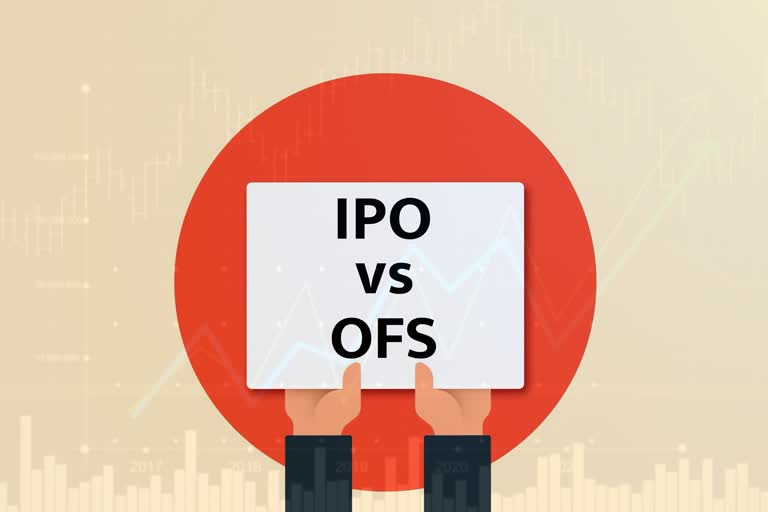Business Desk, ETV Bharat: As stock markets start recovering from the bloodbath seen on Dalal Street in March and April this year after the coronavirus outbreak shut down the economy, companies are now gaining confidence to initiate the public issues and offers that were put on hold due to the pandemic.
Sensing the return of positive sentiment on bourses, a slew of companies, both public and private, are now gearing up to launch their share sale offers in the coming months.
Last week, media reports said that two ‘Offers for Sale’ (OFS) to offload part of the central government’s stake in Hindustan Aeronautical Ltd (HAL) and Indian Railway Catering and Tourism Corp. Ltd (IRCTC) will hit the market soon. Meanwhile, on Monday, leading jewellery firm Kalyan Jewellers also filed its draft red herring prospectus with Securities and Exchange Board of India (Sebi) to raise about Rs 1,750 crore through an initial public offer (IPO).
For retail investors trying to make sense of how an IPO varies from an OFS, here’s a quick and simple guide explaining key differences between the two:
- In terms of purpose
IPO: In simplest terms, a company lists its shares on a stock exchange for the first time when it launches an IPO. Any unlisted company that wants to raise fresh capital to fund expansion or to reduce debt can opt to sell some of their shares to the public through an IPO. Listing of shares on exchanges also increases a company’s visibility.
OFS: The OFS mainly allows promoters to dilute their investment in a company transparently on exchanges. No fresh capital is raised and only a transfer of share ownership happens. Any non-promoter shareholder who owns more than 10% in a company can also sell stake through an OFS.
OFS is possible only if the company is already listed on stock exchanges. Moreover, it is allowed only for the top 200 companies in terms of market capitalization.
- In terms of regulatory procedure
IPO: To file for an IPO, a company needs to hire investment bankers, file a prospectus with SEBI, wait for approvals and then market the issue before it opens in order to garner investor interest. IPOs are usually open for subscription for 3-4 days. Then shares are allotted. The process is complex and can take up to months.
OFS: OFS is much quicker and simpler. The company needs to inform the exchange just two working days before the OFS needs to take place. And the OFS is itself completed in just one day. So there are high chances of retail investors missing an OFS due to lack of information.
- In terms of reserved portions for retail investors
IPO: Anybody who bids for shares worth up to Rs 2 lakh is called a retail investor. In IPOs, 35% of the shares issued are reserved for retail investors.
OFS: OFS reserves just 10% of the shares for retail investors, giving them a much smaller chance than an IPO for share allotment.
- In terms of pricing
IPO: The company along with its bankers fix a price band for the IPO which is disclosed while marketing the issue. Investors can bid within that price range. The final price of the IPO depends on the demand for the shares and subscription figure of the issue. Only bidders who quoted higher than or equal to this price get allotment of shares.
OFS: In an OFS, a floor price is set by sellers at which bidders can apply. Any bid lower than the floor price is not accepted. Share allocation can be done in two ways -- Single clearing price, where all investors are allocated shares at the same price, or multiple clearing price where preference is given to investors who bid at a higher price.
Notably, retail investors are generally offered a discount on the floor price in the range of 5% when they buy shares through OFS, making the offer more attractive for them.
- In terms of bidding procedure
IPO: Nowadays, online trading platforms or net banking portals usually have a web page dedicated for IPOs where one can apply for the desired issue. Investors needs to buy the shares in lots. A lot refers to the minimum number of shares one can bid for and in multiples thereof. Enter the number of lots along with the bid price. Once the application is submitted, investors receive details like IPO application number and transaction details.
OFS: Unlike IPOs, no physical forms or applications are needed to apply for shares in OFS. One just needs to have a trading account and a demat account. Bids for an OFS can be placed directly through the online trading portal or through the help of the broker. Just provide the number of shares and the price at which want to place your bids from 9.15 am to 3 pm on the OFS day. An investor can even buy one single share as there is no minimum limit to participate in an OFS.
- In terms of share allotment
IPO: Share allotment usually takes place within 7-10 days after the bidding is completed. Till then, the funds are blocked in your bank account. Allotment depends on subscription. If the issue is hugely oversubscribed and the number of bidders is much higher than the number of lots on sale, shares are allotted through lottery system.
OFS: Shares are allotted on a T+1 basis, that is, one day after the order is placed. In case of no allotment, the money is refunded the same day.
- In terms of charges
IPO: No special fee is required to be paid by the investors.
OFS: Investors are required to pay charges like brokerage fee, securities transaction tax (STT) and other usual charges they pay for buying or selling shares on their respective trading platform.
Read more:Tame The Bull Like A Pro



